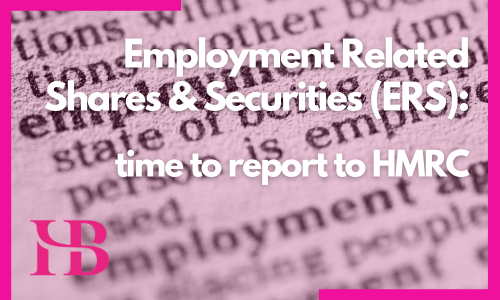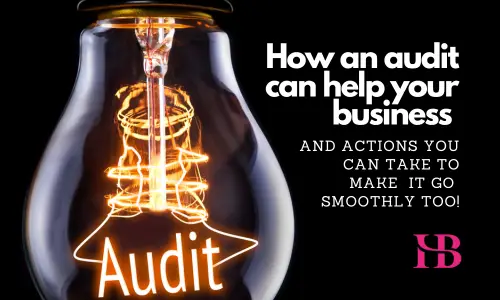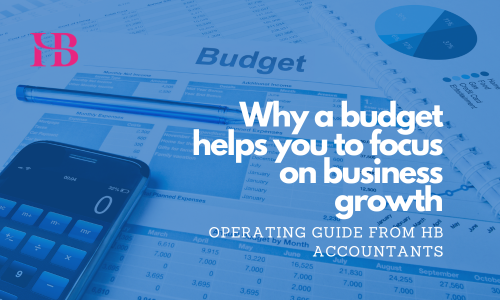Companies have until 6 July 2024 to inform HMRC about ‘Employment Related Securities’ (ERS) arising in the tax year that ended 5 April, 2024. These are securities acquired by a person ‘by reason of employment’. ‘Securities’ include shares and share options – failure of the company to inform HMRC, could mean heavy penalties. If you haven’t already registered your scheme, and your employees have, for example, acquired shares in your company or options to acquire them, then you need to take action.

Tell me about Employment Related Securities (ERS)
The definition of an ‘Employment Related Security’ (ERS) is extremely broad but it can include shares and share options, as well as loan notes, debentures, and warrants entitling their holders to subscribe for securities. The key is that the security comes about because the right or opportunity to acquire them was made available ‘by reason of an employment’.
This means that almost all securities acquired by directors will be deemed to have been acquired ‘by reason of their employment’ and will, therefore, be ‘employment related securities’. It also covers securities acquired by prospective employees, such shares given when ‘joining the company’.
There are some exceptions to the rules – we highly recommend taking advice to determine if you are covered by these. Exceptions may include shares acquired in the course of family relationships or on the sale of a company. The rules are not straightforward and any exceptions should be carefully considered.
HMRC rules for an Employment Related Securities Return
Companies must register all new ERS schemes that deliver a tax advantage to the recipient on HMRC Online Services. This includes one-off awards or gifts of shares. Schemes should be registered by 6 July following the tax year they were established. This includes:
- Share Incentive Plans
- Save as You Earn
- Company Share Option Plans
You only need to register schemes that do not deliver a tax advantage when there’s a reportable event
What is a reportable event
Reportable events include a wide range of situations including:
- Share acquisitions
- The granting, exercise, release, assignment or variation of share options
- Changes to restrictions on shares
- Convertible securities on acquisition and/ or on conversion
- Disposals of securities for more than market value
- Post acquisition benefits from securities, such as a change in the articles which increases the value of the shares
- Any action which artificially enhances or depresses the market value of the securities
This list is not exhaustive and the legislation is complicated. Always seek advice.
Do I need to submit a return if there is no tax advantage and there have been no Reportable Events?
An annual return will need to be made to HMRC for each tax year by 6th July following the end of the relevant tax year in relation to the Employment related securities scheme until it is closed.
If you have previously made an ERS return but have not done so this tax year, you need to officially ‘close’ the scheme on the Government Gateway portal or file a ‘nil’ return.
If you do not submit a return by 6th July, HMRC issues an automatic penalty of £100. Further penalties are issued after this date if the return is not received.
What you need to do
Review all shares and securities transactions made between 6 April, 2023-5 April 2024 and consider if you have live schemes registered with HMRC. Use this information to determine if you need to file a return. If you are unsure, take professional advice.
HB Accountants is here to support your business and personal finances. We offer lots of support for business owners, alongside accountancy, tax, audit and payroll.
For more information about all the ways HB goes above and beyond for you, your company and our community, contact the team at HB Accountants. We’re here to help
The information contained above is for general guidance purposes only. Whilst every effort has been made to ensure the contents are accurate, please note that each individual has different circumstances and it is essential that you seek appropriate professional advice before you act on any of the information contained herein. HB Accountants can accept no liability for any errors
Read our latest blogs below
- HMRC Advisory Fuel Rates (AFRs) from 1st June 2025
 HMRC has published the latest Advisory Fuel Rates (AFRs) which apply from 1 June 2025. AFRs are the official rates used when reimbursing employees for business mileage in company cars. They’re reviewed every quarter (February, May, August and November) and adjusted in line with fuel prices.
HMRC has published the latest Advisory Fuel Rates (AFRs) which apply from 1 June 2025. AFRs are the official rates used when reimbursing employees for business mileage in company cars. They’re reviewed every quarter (February, May, August and November) and adjusted in line with fuel prices. - How an audit can help your business (and actions you can take to make it go smoothly too!)
 An audit may be a legal requirement for your business but a well managed audit can also boost your business growth and ensure that it is operating in the best way possible.
An audit may be a legal requirement for your business but a well managed audit can also boost your business growth and ensure that it is operating in the best way possible. - Why a budget helps you to focus on business growth
 Are you looking for clarity over the future direction of your business? Do you want to know the actions you should take in order to grow your business? Then consider taking time to create a budget for your business.
Are you looking for clarity over the future direction of your business? Do you want to know the actions you should take in order to grow your business? Then consider taking time to create a budget for your business. - How a SME Owner Can Create More Time
 SME owners and managers – are you part of the one in five small and medium-size enterprise managers that work on average an additional 3 hours a day on a regular basis? Or one of the 33% that claim that there just aren’t enough minutes in a day to get everything completed? (The Independent study … Continue reading
SME owners and managers – are you part of the one in five small and medium-size enterprise managers that work on average an additional 3 hours a day on a regular basis? Or one of the 33% that claim that there just aren’t enough minutes in a day to get everything completed? (The Independent study … Continue reading - A New Academic Year for our Student in Zambia
 As the new academic year unfolds in Zambia, we are delighted to share an update about our sponsored student, Getrude. Currently in her second year at Chalimbana University, Gertrude is studying Business Administration in Accounting and Finance.
As the new academic year unfolds in Zambia, we are delighted to share an update about our sponsored student, Getrude. Currently in her second year at Chalimbana University, Gertrude is studying Business Administration in Accounting and Finance.

